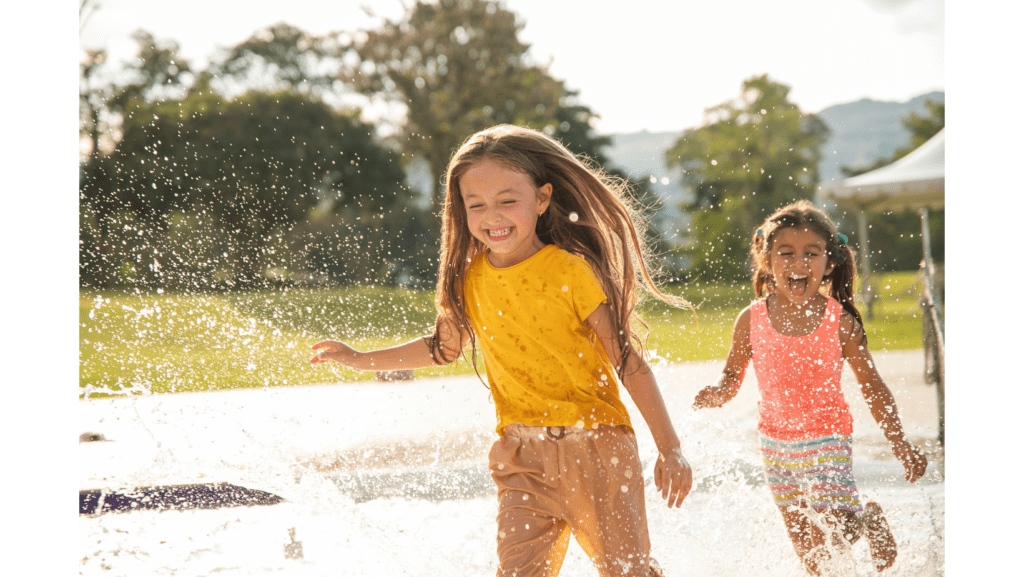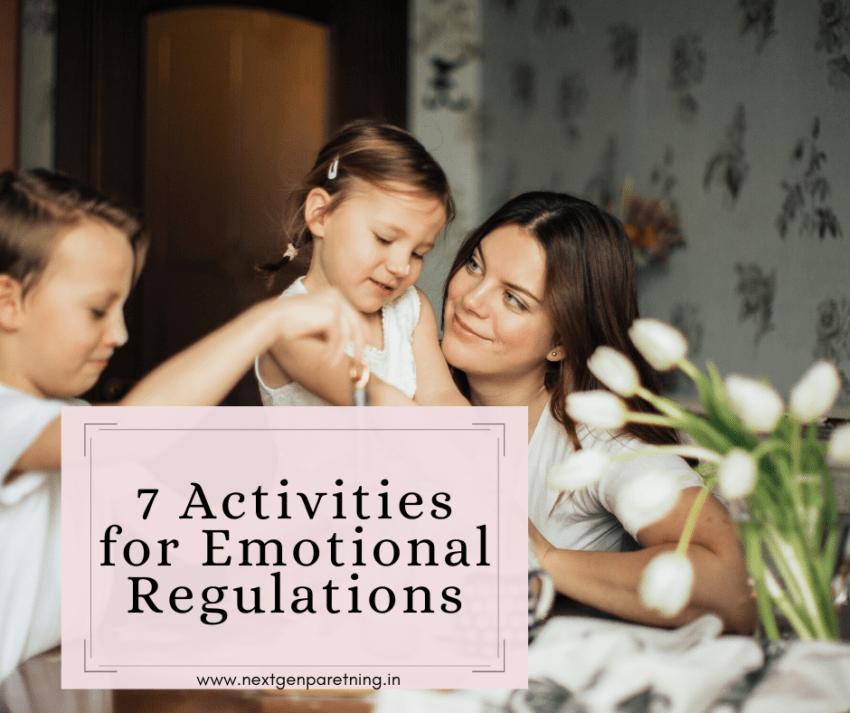While reading the word emotional regulation we think about what this is and why it is important to teach children about it. What is the point and science behind the words ‘emotional regulation’, and why are these activities for emotional regulation in children important?
And why is everyone forced to teach it to the children? Why do all psychologists focus on teaching this at an early age?
Well, it is because emotional regulation is as important as ones physical health. It directly affects a person’s physical health and mental well-being.
What is Emotional Regulation?
Emotional regulation is the skill to control one’s own emotional state (negative or positive) and give it proper direction.
For instance, there may be some situation that triggers a person. A person develops thoughts according to the situation positive or negative.
Then its thought sends signals to the body and mind, the mind feels anxious, overwhelmed, worthless, or stressed for example and the body feels tired and stressed.
This loop will affect the person’s behavior and start to quarantine itself, causing them to lose their appetite or overeat.
The whole cycle keeps repeating until a person mindfully starts to come out of this loop.
There are many situations in life that give us discomfort or pleasure and in both situations, a person has to come out from the loop and regulate the emotions mindfully.
This is called emotional regulation.
Why is Emotional Regulation Important?
A person needs emotional regulation to cope with all the situations that happen in their whole life. If a person can regulate their emotions it becomes easy to deal with difficult situations.
The chances of having depression, anxiety, and other mental disorders decreased.
A person’s emotional intelligence improves and can do well-regulated behavior in a difficult situation. Temper levels decrease and be positive in challenging situations.
Related Article- How to Teach Self-Emotional Regulation in Children
Why is it crucial to teach Emotional Regulation to children?
Children are like soft clay which can be easily molded. An average person learns emotional intelligence till adulthood.
Children also have a tendency to learn quickly and effectively if guided properly. When a child is a toddler they have almost zero emotional regulation. To develop emotional regulation in children a parents have to be calm and also self-emotional regulated.
I prefer that the parents also do some activities for their own emotional well-being to develop co-regulation with children.
When a child learns emotional regulation from childhood it will give them the power to deal with those difficult emotions when they reach adolescence.
In adolescence, they face many difficulties as they are about to hit puberty and start hormonal fluctuations.
Also, emotional regulation helps children deal with academic pressure, peer pressure, bullying, body shaming, etc.
So, teach your children some amazing activities that help them to regulate all their emotions.
As a parent, it is also necessary to co-regulate your emotions and that’s why you also have to practice those activities.
Article you might like- How to Make Communication Effective with Children

Activities for Emotional Regulation Children
Before heading to the activities for emotional regulation, it is also important to have the acceptance for emotional regulation. As is shows that we are human being and have all kind of emotions.
Having the ability to regulate emotions means that you can express all emotions and then recover from them.
Activities for emotional regulation help one better if a person can recognize and accept those emotions.
Breathing Exercise
It is scientifically proven that our breath synchronizes with our brain waves. When we start to focus on breathing and try to regulate, it synchronizes with brain waves and calms our thoughts.
There are many available techniques for breathing exercises, do what suits your child. You can start with the simplest technique to watch your breath. It is easy for beginners and children can easily do it.
Learn the breathing technique and teach your child. Don’t force them harshly as in the beginning, it may be tough for them to concentrate on breathing. Give them time to learn and focus.
Journaling
Writing your emotions in your own words is the best practice for young children. When they start writing about their emotions and recognize the outcome of those feelings they start to observe the pattern of their emotions.
They can recognize the trigger points and behavioral patterns. They also can focus on their thoughts mindfully while writing their emotions.
Journaling is the best tool for keeping track of your mental well-being. So, encourage your children to express their emotions through writing. It is a mindful activity to recognize, regulate, and rewire emotions.
Pursue Hobby
Let your child explore to pursue their hobby. When they get involved in the hobby they can express themselves easily. They also start to recognize themselves and learn about who they actually are, what are their feelings, and how to express them.
No matter what their hobbies are painting, music, dance, riding, or travelling. It could be anything.
Related Article- Amazing Activities for Children in Summer Vacation
Physical Activity
Any Physical activities like running, cycling, swimming, dancing, etc release hormones called endorphins and dopamine.
Endorphins help relieve pain, reduce stress, and improve mood. Dopamine helps to feel good and motivated.
When you feel low on emotion, try to at least walking for 20 to 30 minutes. It helps to give your mind time to think mindfully and clear the brain fog.
Yoga and Meditation
Yoga and meditation both are mindful activities. They both help your child to be strong physically and mentally.
Yoga can help them to get out of the loop of physical symptoms like fatigue, stiffness, and laziness.
Meditation helps the child to improve their focus and teaches them to watch their thoughts mindfully. It also increases the resilience to cope with negative thoughts, and perseverance to give direction to their thought.
Reading
Encourage your child to read regularly, and give them books of their choice according to their age. Whether it is a comic book, picture book, fictional or non-fictional book, anything it could be.
The habit of reading books gives your child tremendous opportunity to learn and reflect. They get the idea of the character of those books and can understand many factors of the character.
Which helps them to learn about different kind of situations, emotions and develop critical thinking.
This learning helps them to channel their thoughts and emotions and eventually learn self-emotional regulations.
Article You Must Read- Do You Know the Effect of Social Media on Teenagers?
Explore the nature
Nature has a healing power. Give your child exposure to nature, whether it is playing in the sand, walking barefoot in the garden, playing with water, or just exposure to the sun.
These all help children to connect with the nature and purify all the negative energy which bother to your child to thrive.
Spending time with nature is like a therapy that helps every human being to cleanse the negative emotions and helps to be healthy physically, mentally, and emotionally.
Related Article- Awesome Activities for Hyperactive Children
Break the cycle
In the techno-savvy world, it is difficult to stay positive all the time. Social Media plays a big role in our lives and affects our lifestyle.
Our children have a profound impact of social media and the gaming world. The constant exposure to influencers and their lifestyle increases the comparison between friends and race for being top of the world and affects children’s mental health.
It is our responsibility to give them a sustainable lifestyle where they can live and thrive to their potential.
Guiding them to a lifestyle that gives them the power to survive and live healthy physically and emotionally is the priority for parents.
Break the cycle of unhealthy lifestyles like constant usage of mobile and scrolling social media for a long time, eating habits, sleeping habits, etc.
Conclusion
Remember a simple change in your lifestyle and including some mindful activities in your child’s life can create a big impact in their future.
Also, show them how to live a healthy lifestyle by your actions not only by giving them lectures.
The increased number of children having stress, and anxiety shows us that all we have to change the direction of our lives. Started to live life more mindfully than ever to cope with life’s challenges and to develop resilience.
Also, try to learn co-regulation emotions with your children which helps you to make connections with them.
I hope you liked this topic and get valued from it.
You can share your experiences in the comment section. We love to hear from you and help you.
Happy Parenting.
